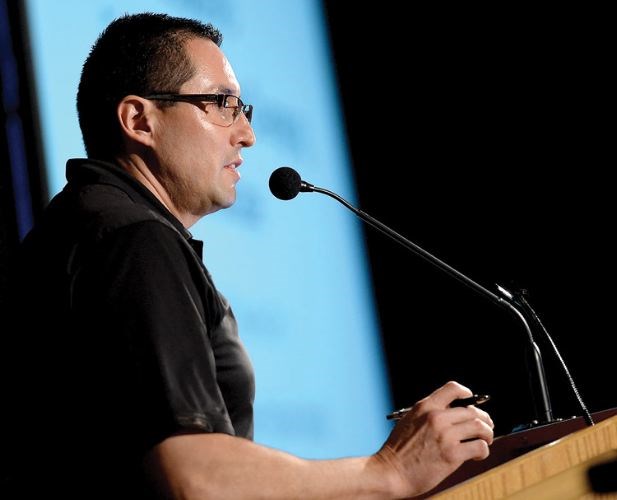VANCOUVER -- Industry and First Nations have been thrust into business together on the B.C. landscape, so 22 champions have come forward to lead the charge for success. Eleven of these champions are aboriginal leaders, the other 11 are select industrialists. They have been called together by the B.C. Business Council and the B.C. Assembly of First Nations.
"They will meet quarterly over the next three years and ultimately work towards the development of policy approaches, pilots and best practices for First Nations and businesses in B.C.," said a joint statement issued by the two founding groups.
Some of those champions took the stage Friday at the Nation 2 Nation forum being held in Vancouver. They gave their views on what is needed for the mutual benefit of all stakeholders.
The panelists included Chief Derek Orr of the McLeod Lake Indian Band, former Initiatives Prince George board member Byng Giraud (now vice-president with Woodfibre LNG) and Chief Joe Alphonse of the Tsilhqot'in National Government.
Orr was called to the table due to the many business ventures owned and operated all around the Prince George region as subsidiaries of the McLeod Lake Indian Band.
These logging, sawmilling and construction firms allowed for meaningful employment on their own projects and collaboration in larger projects led by non-aboriginal interests. They have been careful to keep their operations close to home, so the band members who work for these subsidiaries can go home at night to their families.
Taking on jobs in the oil patch, for example, takes the workers away for long chunks of time.
"Capacity (the ability of a community to fulfill its own needs) is always an issue for any First Nation," said Orr.
"There are a lot of CEOs I have a relationship with where we can have those candid conversations (about aboriginal participation in large-scale projects). By focusing on the problem, not the personality, good things happen. Once you get those positive people around you, keep those people around you."
Alphonse has activated his members to successfully block a number of major projects from taking place on their traditional territories, but he said he has also partnered with others who came to the table willing to do things the aboriginal way.
The success of that control over their own interests is starting to show.
He said when he was first elected chief, only four kids graduated from Grade 12, but this year that number was up to 18 and a culture of knowledge was taking root.
"Never in my career have I joined a larger First Nation organization. I believe the real work lies at home. This is a first for me," Alphonse said of the business collaboration.
"We want to generate revenue. We want success stories. We want big companies to come in. But to avoid conflict, what you'll have to do is make contact with us, first. We welcome companies. Our door is open in the Tsilhqot'in. Come on in and talk with us."
Giraud has been involved in many high-level projects, including Ridley Terminals, Huckleberry Mine, and Imperial Metals. He said the importance could not be overstated of starting any project idea off by knocking on the door of the affected First Nations, and do so with full expectation of making them active partners.
"If you get to know their kids, the elders, the everyday members of those First Nations so you can say hi to them on a daily basis, then as a company you are not going to falter," he said.
"If you are going in a First Nation's traditional lands - and you are - acknowledge that. Start opening your ears and closing your mouth. Learn. Start from that position of 'I don't know' and ask. I'm the crown prince of stupid questions. Get people talking about themselves. Get to know who their families are. It's not all linear. Stop focusing on getting straight to the deal. And I believe in being transparent. I think huge amounts of the things we keep secret (in business plans) we don't need to keep secret. We've got to get around that. Most of the stuff should be all out there. Some things need to be kept confidential, but broadly speaking, this relationship is not served by all the secrecy."
Companies need to toss away their unilateral timelines prepared before any First Nations, he added.
Until time is spent in the First Nation community becoming friends, not contacts, there is no path to working together.
Giraud also stressed the vital importance of going beyond the standard relationship check-boxes on the government forms. Yes, it was a requirement in almost every proposal to include First Nations in the labour force, and add in training components for the jobs on the site, but if the project is a long-term operation, the relationship needs to reflect that.
"We like to provide numeracy and literacy (education supports) that is delinked from jobs with our own company. If you only tie the training to your specific jobs, you're setting yourself up for failure. It is so important to recognize and fund the other phases (of the aboriginal community's specific basic education needs). That starts by acknowledging you don't know and you are seeking to help."
The president and CEO of the BC Business Council, Greg D'Avignon, said their organization was about to launch one of the deepest "who you know" programs ever aimed at aboriginal youth working in the resource sector.
"We now have 45 companies hiring aboriginal youth for a two-year period of time," D'Avignon said.
"They also have the opportunity to come together as a group so they can network among themselves. If they continue to work for those companies, that's great," but if they take their enhanced skills and personal networks back to their First Nations as young leaders in other roles, that was also a long-term win for the province.



